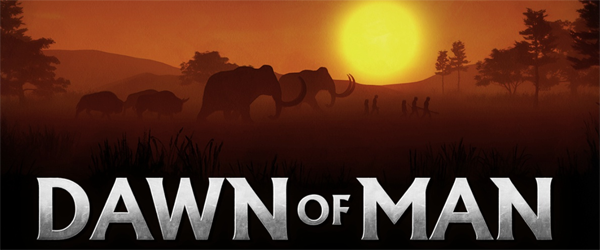
There was a surprise indie hit on Steam a few months back. The prehistoric city-builder / management sim Dawn of Man saw lots of buzz around its release date and sold well beyond the developers' expectations. Did you buy it? Is it on your radar, but you haven't purchased it yet? Have no idea what Dawn of Man is? Well, it's a pretty good indie game that is well worth a look for those into city-builders and management sims. If you liked Banished (and you should have liked Banished if you played it), then I would say you owe it to yourself to give Dawn of Man a look.
I released an early version of this guide (in video form) to my Patreon backers.
Dawn of Man can be a difficult game to figure out, especially as you work your way into the middle sections of the game where the options available to you suddenly explode into a myriad of possibilities. Some of these difficulties can be traced back to the game having a sometimes-lackluster U.I. that makes some of the management more difficult than it needs to be. Other difficulties are simply things that you have to experiment with to figure out.
Well, I've done a bit of experimenting, and am happy to offer some of my observations. I hope these tips will help you to get into Dawn of Man with less of the headaches and growing pains that I experienced, so that you can get to enjoying this surprise indie hit more quickly.
... [More]
5097ffe0-fe80-44c3-8f07-9d90fba843e3|3|5.0
Tags:Dawn of Man, Madruga Games, indie gaming, prehistoric, strategy, city management, Steam, PC, hunting, work area, mammoth, technology, paleolithic, mesolithic, neolithic, copper age, bronze age, iron age, raider, YouTube

From what I've read, Madruga's indie management sim Dawn of Man has proven to be far more successful than the developers had ever imagined. The game made it onto Steam's top-sellers list the month that it released and was a surprise hit. I've actually had the game on my radar for quite some time. I saw a preview for it back in mid 2018 in a YouTube video about "upcoming strategy games for 2019". I watch those from time to time to see if any new games are coming out in the niche genres that I enjoy -- like city-builders, strategy games, and horror games.
My two favorite PC games are the Civilization games and city-builders like Cities: Skylines, so a management sim / city-builder set during the stone, bronze, and iron ages seemed right up my alley.
A prehistoric city-builder is an idea that is right up my alley!
Like any good management sim or city-builder, Dawn of Man has a "one-more-season" addictiveness that kept me playing into the wee hours of the morning trying to balance my food stockpiles and finish that next set of construction projects before saving and quitting. I'd tell myself that I'd play it for an hour or two, then switch to Sekiro, or work on a Civilization strategy guide, but five hours later, I'd be building palisades and watchtowers to protect my little neolithic farming village from plundering raiders, or sending an expedition halfway across the map to hunt one of the last few remaining wholly mammoths.
Learning by doing
You start the game as a small group of 7 paleolithic humans (half of which are children) living in a handful of animal skin tents. You hunt animals, gather sticks and stones, pick berries and nuts, craft simple tools, and eventually expand your handful of tents into a bronze or iron age city -- complete with walls and an army.
Your progress through the eras is governed by the accumulation of knowledge points. These knowledge points are gained by completing certain tasks or milestones within the game. Your people effectively learn by doing, and through repetition. Each "first" within the game will earn a knowledge point. Build your first hut: gain a knowledge point. Hunt your first deer: gain a knowledge point. Craft your first composite spear: gain a knowledge point. Plant your first crops: gain a knowledge point. And so on.
You accumulate knowledge points by
completing in-game tasks or milestones.
After that, you gain further knowledge points by repeating certain tasks or stockpiling certain resources. Crafting 10 bows will be another knowledge point. Drying and curing 100 units of meat would be another knowledge point. And so on.
You're constantly and gradually earning new knowledge. You can turn in lump sums of these knowledge points for new technologies in a technology tree.
I like this mechanism of "learning by doing". There is no place-it-and-forget-it "research" building or school that passively accumulates knowledge points like what you might see in other strategy games like Civilization. Learning is an active process for your little simulated people, even though most of your knowledge points will come from activities that are automated anyway.
... [More]
8bb5fcaa-40f9-429e-bb8c-c0e44b7d6529|2|5.0
Tags:Dawn of Man, Madruga Games, village, city, strategy, city simulation, city planner, prehistory, paleolithic, mesolithic, neolithic, copper age, bronze age, iron age, mammoth, hunting, gathering, indie gaming
Last week, just in time for the announcement (and release) of a new expansion for Cities: Skylines, I posted a video analysis on YouTube discussing what I perceive as weaknesses in the modular design philosophy behind Skylines' myriad expansion packs. The full video is available on YouTube (and embedded below), but I've also transcribed the text in blog form for those who may prefer reading over watching/listening.
The video is up on YouTube.
I want to start out by saying that I love Cities: Skylines. Skylines is -- without a doubt in my mind -- the single best city-builder since SimCity 4, which released in 2003 (over 15 years ago, as of the time of this recording). When I watched the first trailer for the game, in which the player apparently custom-builds freeway ramps and interchanges from scratch (at about 40 seconds into the trailer), I was sold on this game! After years of having to use boring, pre-fabricated stock on-ramps and interchanges, the little civil engineer withing me practically jizzed in his pants at the idea of being able to build my own highway ramps and interchanges! And there was no looking back.
Cities: Skylines gloriously succeeds where games like SimCity (2013) and Cities XL miserably failed. It picks up the mantle of the great SimCity games of yester-decade, and brings it into the 21st century with deep simulation based on agents, a sleek and modern UI, extensive customizability and moddability, and an attractive 3-D graphics engine. It's made all the more impressive by the fact that the game's developer, Colossal Order, is a small, independent studio that had something like nine people working for it when the game initially launched. And a company with all the manpower and resources of Electronic Arts only managed to produce a flop like SimCity 2013.
... [More]
cdac9d28-8482-4449-a673-ff10d4b7cc87|0|.0
Tags:Cities: Skylines, Cities: Skylines: After Dark, Cities: Skylines: Snowfall, Cities: Skylines: Natural Disasters, Cities: Skylines: Mass Transit, Cities: Skylines: Green Cities, Cities: Skylines: Parklife, Cities: Skylines: Industries, Cities: Skylines: Campus, Colossal Order, city planner, city simulation, strategy, Steam, Paradox Interactive, expansion, YouTube, Sid Meier's Civilization, Civilization V, Civilization V: Brave New World, Civilization VI, Civilization VI: Rise and Fall, Civilization VI: Gathering Storm

Here's something that I've never done before: a review of a game mod! I don't play mods very often. When I play games, I usually want to play the game that the creators created in order to get a feel for what their intent might have been. For some of the more sandboxy PC games that I play (like Cities: Skylines or the like), I might try some small mods.
There has yet to be an official game quite like Microprose's 1999 release, Birth of the Federation.
For this one instance, however, I'm making an exception because this particular mod fills a very specific niche desire for me that has gone unfulfilled for around 15 or 20 years. The "New Horizons" mod for Stellaris is finally allowing me to play a full 4-x strategy game set in the Star Trek universe. I haven't been able to do that since Star Trek: Birth of the Federation, developed by Microprose for Windows 98!
The creators seem to have been inspired by BotF.
Yes, there have been other Star Trek mods for other games in the past, and there's even some community projects to create spiritual successors to Birth of the Federation (such as Star Trek: Supremacy). The problem is that I've yet to ever see one of these get finished. "New Horizons" for Stellaris is still a work-in-progress, but it is mostly functionally complete and fairly robust. Since Birth of the Federation holds such a special place in my heart, I'm going to take a stab at reviewing "New Horizons" and see how it compares to my personal favorite [official] Star Trek game of all time.
Built on the back of Stellaris
"New Horizons" is, of course, a mod for the PC game Stellaris (developed and published by Paradox). Because of this, it takes advantage of most of Stellaris' strengths, but it is also hamstrung by many of Stellaris' faults.
"New Horizons" makes excellent use of the massive size and scale of Stellaris' maps by featuring a detailed recreation of the canon Star Trek galaxy, and including a surprisingly exhaustive roster of Star Trek races and factions -- all of whom are playable. Yes, of course, the big players like the Federation, the Romulans, Klingons, Cardassians, Ferengi, Dominion, and Borg are all here. As are all the expected ancillary empires like the Gorn, Tholians, Orions, and so forth.
The playable roster is surprisingly vast and exhaustive.
It doesn't end there, though. This mod also features a crap-ton of "aliens of the week" as fully-featured, playable empires. They aren't "minor races" like what we had in Birth of the Federation or the city states of Civilization V or VI. They don't just have one planet and a handful of ships just waiting for a "major faction" to conquer or absorb them. The obvious choices like the Vulcans, Andorians, Bajorans, are all there. The game also features empires like the Sheliak, Anticans, Selay, Caitian, Cheron, Dosi, Hirogen, Kazon, Krenim, Kelpian, and more! If you have a favorite space-facing civilization from any episode of Star Trek (including Gamma Quadrant aliens from DS9 and Delta Quadrant aliens from Voyager), there is a very good chance that it's a playable faction in "New Horizons"... [More]
2c39f87b-9de4-4abc-b74c-781e4f27c822|0|.0
Tags:Stellaris, Star Trek, New Horizons, Stellaris: New Horizons, mod, PC, Steam, 4x, strategy, user interface, space, exploration, war, starship, starbase, warp drive, glitch, casus belli, Star Trek: Birth of the Federation, Star Trek: the Next Generation, Star Trek: Deep Space Nine, Star Trek: Voyager, Star Trek: Enterprise, Star Trek: Discovery, Star Trek: Beyond, Star Trek II: the Wrath of Khan, Star Trek VI: the Undiscovered Country, Federation, Klingon, Romulan, Cardassian, Ferengi, Dominion, Borg, Gorn, Tholian, Orion Syndicate, Vulcan, Andorian, Tellarite, Kazon, Hirogen, Alpha Quadrant, Beta Quadrant, Gamma Quadrant, Delta Quadrant

Last year, after my initial enthusiasm for Civilization VI began petering out (until the announcement of the expansion), I went on a bit of a space-4x bender. I spent some time with the rebooted Master of Orion. It was good, but I was underwhelmed by its limited scale and casual depth. I also planned on hitting up Endless Space 2. I played the first Endless Space briefly off-and-on, and I liked it, but kept getting diverted to other games and projects and never really allowed myself the time to get comfortable with the game.
But first, before diving into Engless Space 2, I wanted to tackle a game that's been in my library for over a year: Stellaris. This is an epic, space 4x strategy game developed by Paradox Interactive -- the same developer who brought us the infamously complex and detailed Europa Universalis and Crusader Kings series.
A gentler learning curve than Europa Universalis
I was hesitant to try Stellaris because of its relationship to Europa Universalis (and its notorious complexity), but I was surprised to find that Stellaris has a bit of a gentler learning curve. Instead of starting you out "in median res" with a developed European kingdom with armies already mobilized, alliances and rivalries already in place, and wars already in progress, Stellaris starts you out in control of a single planet in a single star system, with just a small fleet of corvettes, a construction ship, and a science ship at your disposal. You send your science ship to explore the other planets in your system, then on to the nearest star, and slowly explore from there at a much more comfortable pace that is akin to a game like Civilization or Master of Orion. Unlike with Crusader Kings and Europa Universalis, I didn't feel like I needed to sit down with a history textbook in order to know what was going on at the start of my game.
You start the game with a single science ship to explore your own star system, and work your way out from there.
Don't let this initial apparent simplicity fool you. Stellaris is still quite deep, quite complex, and the galaxy that you'll explore really does feel vast. While the Master of Orion reboot has galaxies with a mere dozens of stars (very few of which contain more than one or two planets), Stellaris features a default galaxy size consisting of hundreds of stars, most with their own planets, which might (in turn) contain moons.
There's still going to be some trial and error, as you'll make a lot of mistakes and miss a lot of opportunities in your first few games. If you left the "ironman" mode disabled, then you'll at least be free to re-load earlier saves and try to play better if anything goes horribly wrong. However, Paradox throws a bit of a curve ball at players by disabling achievements if you disable ironman mode. You won't stumble into achievements in your learning game(s) or by save-scumming; you'll have to earn them in the Ironman mode!
You also won't be able to manually save while in Ironman mode. You have to wait for the game to perform an auto-save (which I think happens every few in-game months, or maybe every year?). This can be very annoying if you don't notice the "saving game" popup and don't know if the game has saved your most recent actions. It's fine to include a single save file for this mode, but they could at least include a "Save and Exit" option in the pause menu! [More]
2caf8b87-93d3-4596-b06c-1db37d776061|0|.0
Tags:Stellaris, Paradox Interactive, strategy, grand strategy, 4x, science fiction, space, faster than light, hyperspace, wormhole, anomaly, research, terraforming, war, diplomacy, Master of Orion, patch, Skinner Box, Star Trek: Birth of the Federation
|

| 12 | | | | | | | 60 | | 11 | | | | | | | 55 | | 10 | | | | | | | 50 | | 09 | | | | | | | 45 | | 08 | | | | | | | 40 | | 07 | | | | | | | 35 | | 06 | | | | | | | 30 | | 05 | | | | | | | 25 | | 04 | | | | | | | 20 | | 03 | | | | | | | 15 | | 02 | | | | | | | 10 | | 01 | | | | | | | 05 |
|